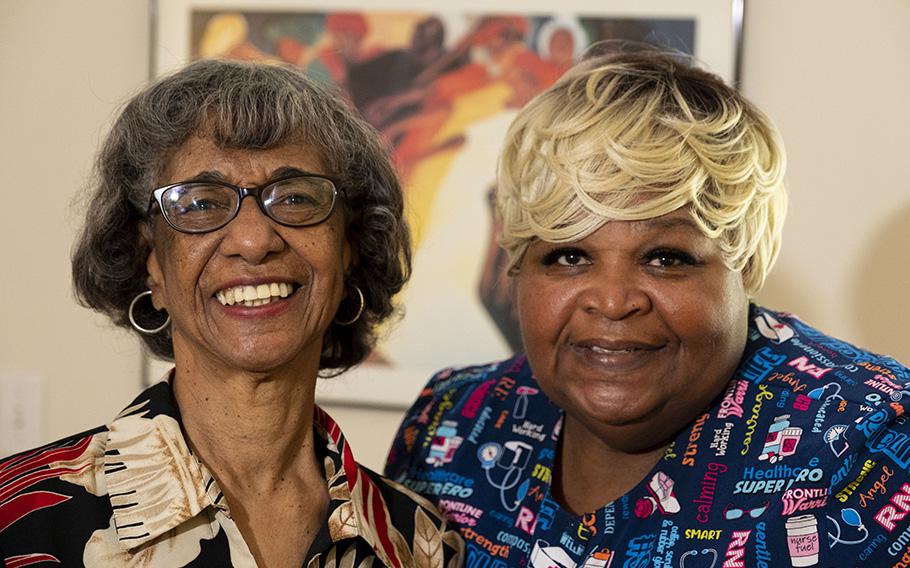
Lillie Williams, right, is seen in her residence in Virginia Beach, Va., alongside her nursing assistant Shirley Braswell. Williams’ husband was diagnosed with dementia three years ago. (Billy Schuerman/TNS)
(Tribune News Service) — It has been more than three years since Lillie Williams noticed something was “just not right” with her husband, Alfonso.
“I thought his hearing was bad,” Lillie said. “The doctor checked his ears, and she said, ‘Mrs. Williams, he has dementia.’”
Alfonso, an 87-year-old Virginia Beach resident and U.S. Air Force veteran, was diagnosed with frontotemporal dementia. The disorder is debilitating; the diagnosis, life-changing.
“Naturally, I figured I could do it. I am strong — I could be his caregiver. But that wasn’t so,” Lillie said.
According to the Elizabeth Dole Foundation, there are more than 5.5 million spouses and children serving as a caregiver to their disabled military veteran. Betsy Eves, a fellow for the foundation, said most loved ones find themselves stepping into the role of a caregiver “out of necessity.”
“Your family member is wounded, ill or injured and you have no other choice but to help them, so you jump into this survival mode where you just take care of everything for your service member,” Eves said.
Dubbed “hidden heroes” by the Elizabeth Dole Foundation, family caregivers of military veterans are often isolated, forced to give up careers or lifestyles to provide around-the-clock medical and emotional support. The foundation, which was created in 2012 by North Carolina Sen. Elizabeth Dole, aims to connect family caregivers of military veterans with resources they may need.
The resources available can range from mental wellness therapy to connecting the family with a hired personal care assistant to care for the veteran.
“The resources people need looks different from family to family. I don’t need the same kind of support as a person who has a veteran with an amputation,” said Eves, who is a caregiver to her husband, a disabled Army veteran with a traumatic brain injury.
The emotional and physical struggle of caring for your disabled veteran, Lillie said, is an experience she knows all too well.
“You cry a lot because it hurts you. He is not the same man I married 67 years ago. This is a different man,” Lillie said. “But it is all right. This is our life.”
Lillie acted as Alfonso’s sole caregiver for about a year, supported by her “love team” — the couple’s adult children. But Lillie soon began struggling with anxiety and losing weight from the stress of caring for her husband.
“It is hard, emotionally, physically — all that,” Lillie said.
After persistent urging from her own doctor, Lillie finally gave in and sought out a caregiver for Alfonso. In November 2021, the Williamses were matched with Shirley Braswell, a certified nursing assistant and personal care assistant, in partnership with Senior Services of Southeastern Virginia and the Department of Veteran Affairs.
Braswell provides in-home assistance for Alfonso three days a week and some evenings. With 33 years of experience under her belt, Braswell said caring for someone with dementia can be “extremely stressful,” whether you are a family member or a professional.
”It is important that you know what you are doing. Someone who doesn’t understand might get angry with him. Or if he gets irritated, you have to calm him down or change the subject to get his mind off what he is angry about,” Braswell said. ”If he says it’s raining, I say, ‘It sure is. It is raining hard.’”
According to Mayo Clinic, individuals suffering from frontotemporal dementia may have extreme changes in behavior and personality and speech and language problems.
“Sometimes I have to tell families, ‘I have got this. You can leave me with him. Let me do my job,’” Braswell said.
Lillie and Braswell laughed as they chatted, discussing Alfonso’s love of jazz, boxing and spur-of-the-moment adventures — glimmers of his past self that occasionally break through his diagnosis.
Braswell took a moment to check on Alfonso, who was napping in the next room. She returned joking he was “conked out” from a night of dancing in the street to soul music.
In a way, Braswell helps take care of Lillie, too, offering a listening ear as Lillie navigates her emotions during trying times.
“When Al is asleep like now, she will ask me ‘How are you doing today?’ as an opening. I will say, you know, ‘Today has just been rough.’ And she listens. There is nothing she can do, no help, but it makes me feel better,” Lillie said.
Since Braswell was matched with the Williams family, Lillie said she is more “self-serving” — working to take care of what she needs. She has started gaining weight back and gotten a handle on her anxiety.
“I have accepted that this will be. And it is going to get worse,” Lillie said. “But we really lucked out with Ms. Braswell.”
To family caregivers of disabled loved ones, whether they are military veterans or not, Lillie encourages them to seek out the resources they need.
“You may not think you need a caregiver. But you do,” Lillie said. “A caregiver will take some of the weight off your heart and off your back.”
©2023 The Virginian-Pilot.
Visit pilotonline.com.
Distributed by Tribune Content Agency, LLC.